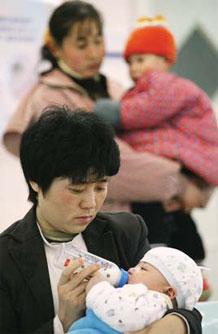SHANGHAI - About 85 percent of 452 Shanghai residents polled for a survey believe breast milk is superior to other dairy substitutes for the development of infants.
 A woman feeds her baby bottled milk in a children's hospital in Shanghai. File photo provided to China Daily The survey, conducted by Shanghai Morning Post after a clinical investigation found no evidence that milk powder produced by a Chinese company caused three infants to grow breasts, was aimed at finding out the consumers' confidence in milk powder.
A woman feeds her baby bottled milk in a children's hospital in Shanghai. File photo provided to China Daily The survey, conducted by Shanghai Morning Post after a clinical investigation found no evidence that milk powder produced by a Chinese company caused three infants to grow breasts, was aimed at finding out the consumers' confidence in milk powder.About 33 percent of the respondents said they will no longer buy domestically manufactured milk powder because they doubt the quality, while 41 percent said they usually buy imported milk powder.
About 10 percent said they will buy milk powder that comes at a price higher than 300 yuan ($44) per jar (900 grams), while 20 percent said they do not want to pay more than 100 yuan per jar.
Some 43 percent said they will go for milk powder that is in the price range of 100 to 200 yuan per jar.
Reportedly, some working mothers, who have no time to breastfeed their infants during the day, pump their breast milk at noon and bring it back to their children after work.
Specially designed equipment to preserve bottled breast milk is popular in online shops.
The World Health Organization and China's Ministry of Health both suggested caregivers add complementary food for infants when they are 6 months old and continue breastfeeding until they are 2 years old or more.
The lack of confidence in domestically produced foodstuff is spreading, according to the survey.
About 63 percent of the respondents said recent cases of poisonous and unsafe milk have made them suspicious of the quality of other foodstuff.
"In the past, I used to dine out very often - almost five times a week," said Gui Hong, a 29-year-old marketing consultant. "Now, I always fix my dinner at home, where I know exactly what I am eating. Otherwise, I am always worried I might have eaten something harmful."
According to a recent survey released by the China Association for Quality (CAQ), a nationwide organization under the control of the General Administration of Quality Supervision, Inspection and Quarantine, consumers have low confidence in locally-made liquid dairy products, too.
The confidence index stood at 68.27 out of 100, according to the survey, which covered 27 brands across 22 large- and medium-sized cities, including Beijing, Shanghai and Ningbo.
Fan Tianshun, chief of the Customer Satisfaction Measurement Center of the CAQ said the index suggests that the dairy industry and the government need to focus more on improving the safety of food products, a Xinhua News Agency report said.





